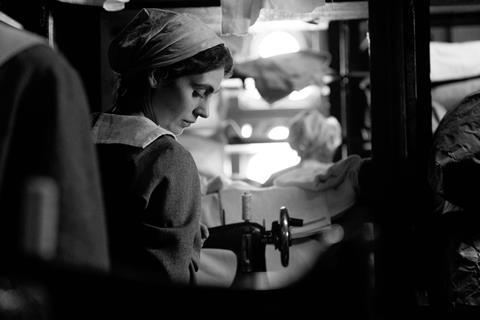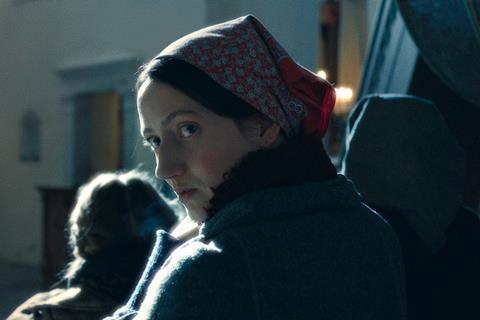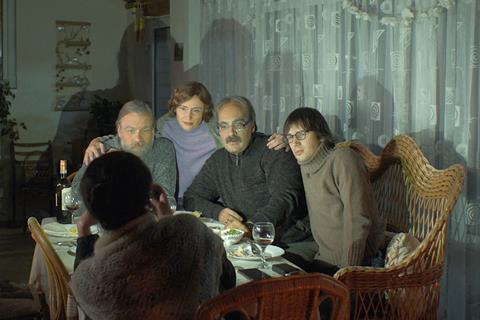Europe has picked up the best international feature Oscar for the past two years. Screen surveys the state of play this cycle for the dominant region.

The Academy Awards’ best international feature film category has been dominated by Europe for the past two years, landing four of the five nominations on both occasions, and winning in 2024 with UK entry The Zone Of Interest and in 2023 with Germany’s All Quiet On The Western Front.
In fact, European films have scooped the majority of awards in the history of the category, which was known as best foreign-language film before the 2020 awards. Of the 76 awards handed out by the Academy since 1948 to foreign-language films (until 1957 as special/honorary awards), 59 have gone to films from Europe. Bafta’s film not in the English language category has seen European films win for 14 of the past 20 years.
Europe again looks likely to be a strong contender for international feature nominations in 2024 and has more films competing than any other region, with 36. For the third year in a row, Russia has not submitted a film, remaining in cultural isolation following its invasion of Ukraine.
One notable trend this year is European countries putting forward films that are in languages other than their own and shot outside their home borders — reflecting the complex patchwork of funding, locations and talent that now goes into a European feature.
France is one of the favourites this year with French director Jacques Audiard’s Mexico-set musical Emilia Pérez, which is primarily in the Spanish language. Premiering at Cannes, it won the jury prize and a shared best actress award for its female cast Karla Sofia Gascon, Selena Gomez, Zoe Saldana and Adriana Paz. Netflix has North American and UK rights.
France will be hoping the film breaks a three-decade barren streak in the Oscars’ foreign-language category (it last won the statuette with Indochine in 1993 and was last nominated for Ladj Ly’s Les Misérables in 2020). The stakes are particularly high for France after the country submitted Tran Anh Hung’s culinary romance The Taste Of Things last year in the international feature category, over Justine Triet’s Palme d’Or winner Anatomy Of A Fall. The latter went on to earn five nominations in other categories and took home an original screenplay Oscar.
Germany has selected Persian-language film The Seed Of The Sacred Fig by Iran’s Mohammad Rasoulof, winner of the special jury prize at Cannes. Although set in Tehran with a predominantly Iranian cast and crew, the film is co-produced by Rasoulof’s German outfit Run Way Pictures alongside France’s Parallel45 in co-production with Arte France Cinéma.
On the eve of Cannes, Rasoulof fled Iran and is now understood to be based in Germany. The film is about an investigator working for the Iranian theocratic regime who aspires to be a judge in the nation’s Islamic Revolutionary Court. In total, Germany has won the category four times, including once as West Germany; it was nominated last year for The Teachers’ Lounge.
The UK has put forward Hindi-language, north India-set Santosh by Sandhya Suri, which premiered at Cannes in Un Certain Regard. The crime thriller about a newly widowed woman who inherits her husband’s job as a police constable is a UK-France-India co-production with James Bowsher and Mike Goodridge producing for the UK’s Good Chaos. The UK has submitted 21 entries over the years, winning for the first time last year with The Zone Of Interest.
Portugal’s entry is Miguel Gomes’s black-and-white Grand Tour, which filmed throughout Asia and won Gomes the best director prize in Competition at Cannes. Set in 1917, Grand Tour centres on a British official in Burma who runs away on his wedding day, only for the jilted bride to follow him across Asia; despite the international storyline, it is filmed largely in Portuguese. The film is Gomes’s third time representing Portugal at the Oscars, following Our Beloved Month Of August for the 2009 awards and Arabian Nights: Volume 2 — The Desolate One in 2016. Portugal has yet to secure a nomination for the Oscars since it began submitting with the 1981 awards.
Other strong contenders this year include Ireland’s entry: Rich Peppiatt’s crowdpleaser Kneecap is the music biopic of Belfast rap trio Kneecap, who formed their Irish-language hip-hop act in 2017 and became unlikely figureheads for a civil-rights movement to save their mother tongue. The film premiered at Sundance, winning the NEXT audience award. Ireland’s sole nomination to date was in 2023 for Colm Bairead’s The Quiet Girl.
Inspired by fact

Denmark’s entry The Girl With The Needle by Magnus von Horn premiered in Competition at Cannes. The black-and-white drama is rooted in the actions of a real-life Copenhagen woman who killed numerous unwanted babies from 1913-20. Denmark has an impressive Oscar track record: four Danish films have won the category, most recently Thomas Vinterberg’s Another Round in 2021.
Romania’s Oscar entry, Emanuel Parvu’s Three Kilometres To The End Of The World, was the winner of this year’s Queer Palm at Cannes. The actor-turned-filmmaker’s drama is about a teenage boy whose life in a conservative Danube Delta community is turned upside down when he is violently attacked for being gay. Romania was last nominated in the category in 2021 with Alexander Nanau’s documentary Collective.
From Belgium, Leonardo Van Dijl’s debut feature Julie Keeps Quiet premiered in Critics’ Week at Cannes, going on to berths at Toronto’s Centrepiece section, Busan and the BFI London Film Festival. Tennis champion Naomi Osaka executive produces the movie, and will likely be on hand to give promotional support. Belgium was nominated in 2023 for Lukas Dhont’s Close and has received seven prior nominations — but has yet to win the trophy.
Several titles that premiered in Cannes’ Un Certain Regard have been put forward, on top of Santosh. They include Armand, the debut feature from Norwegian writer/director Halfdan Ullmann Tondel, which stars The Worst Person In The World’s Renate Reinsve and centres on a murky incident between two young boys at a primary school. Latvia has put forward Gints Zilbalodis’s animated feature Flow, which after Cannes went on to screen at Annecy, where it won four prizes including the competition jury and audience award. The story centres around a cat who teams up with other animals after a flood destroys his home.
Venice launch

Italy has selected Maura Delpero’s Vermiglio, winner of the grand jury prize in Competition at Venice, and a box-office success in its home country. Set in 1944 in an Italian alpine village, it is about the arrival of an army deserter disrupting the life of the village teacher and his family when the eldest daughter falls in love with him. Despite winning the category 14 times, Italy’s last victory came over a decade ago with Paolo Sorrentino’s The Great Beauty in 2014. It secured a nomination last year for Matteo Garrone’s Io Capitano.
Georgia’s entry is Rusudan Glurjidze’s The Antique, which generated headlines after screening in Venice’s Giornate degli Autori. The film was briefly suspended due to a lawsuit alleging copyright conflicts by a trio of production companies, likely due to its explicitly anti-Putin message. The film was inspired by the deportation of thousands of Georgians by the Russian government in 2006.
Icelandic stalwart Baltasar Kormakur represents his country for a fifth time on the Oscar stage with Touch, a romantic drama following one man’s journey to find his first love who disappeared 50 years ago. Focus Features has international rights outside Iceland. The territory has one nomination so far from 44 previous entries, for Fridrik Thor Fridriksson’s Children Of Nature in 1992; Fridriksson remarkably beats Kormakur for entries, with six submissions.
From Austria is historical thriller The Devil’s Bath by Veronika Franz and Severin Fiala, winner of the cinematography Silver Bear at the Berlinale, where it came joint top of Screen International’s jury grid. Set in Austria in 1750, the film is about an oppressed, newly married woman who commits a shocking act of violence. Austria has won this Oscar category twice before — in 2008 for Stefan Ruzowitzky’s The Counterfeiters and in 2013 for Michael Haneke’s Amour (aka Love) — and has secured another two nominations.
Another historical thriller in contention is the Czech Republic entry, Jiri Madl’s Waves, winner of the audience award at Karlovy Vary. Set during the Prague Spring, it centres around a group of journalists who are determined to keep independent news running during the Soviet invasion. The Czech Republic has won the category once before for Kolya in 1997. Meanwhile, Lithuania has put forward Laurynas Bareisa’s Drowning Dry, which explores the aftermath of a near-tragic accident at a family weekend getaway and won best director at Locarno.
Switzerland, Spain, Bulgaria and Ukraine have all selected 1990s-set films. From Switzerland comes Klaudia Reynicke’s Spanish-language Queens (Reinas), a portrait of a family in Lima during a period of social upheaval in Peru. The drama world-premiered at Sundance this year and went on to screen at the Berlinale, where it won the jury prize in Generation Kplus, and Locarno, where it picked up the audience award. Switzerland has won the Oscar twice from five nominations, with Dangerous Moves and Journey Of Hope.
From Spain, Isaki Lacuesta and Pol Rodriguez’s Saturn Return is inspired by iconic indie rock band Los Planetas and set in the late 1990s in Granada. It had its world premiere at Malaga Film Festival, winning prizes for best film, director and editing. Spain has won the international feature Oscar four times and has been nominated 21 times, including last year’s Society Of The Snow by JA Bayona.
From Bulgaria, Kristina Grozeva and Petar Valchanov’s black comedy Triumph launched in Toronto’s Platform and stars Borat Subsequent Moviefilm and The Apprentice’s Maria Bakalova, who also produces. Based on a true story, Bakalova plays a psychic channeller helping Bulgarian army officers search for a mysterious artefact in the early 1990s. The film completes the directing duo’s trilogy of films inspired by bizarre news stories from their homeland, following Glory and The Lesson — both of which also represented Bulgaria at the Oscars, in 2017 and 2015.
Ukraine submits debut

Ukraine’s submission La Palisiada is the debut feature of Philip Sotnychenko. Set in 1996, five months before the suspension of the death penalty, it follows two friends investigating the murder of their colleague. It premiered at Rotterdam in 2023 and went on to be nominated in the European discovery section at the European Film Awards. Ukraine made the international feature shortlist of 15 last year with 20 Days In Mariupol, which went on to win best documentary.
A Ukrainian family is the focus of Poland’s submission, Under The Volcano by Damian Kocur. It is the story of a family on holiday in Tenerife who discover they cannot return to Ukraine due to the Russian invasion. Poland won the Oscar once in 2015 with Pawel Pawlikowski’s Ida and has racked up 13 nominations in total, the last time in 2023 with Jerzy Skolimowski’s EO.
Sweden and the Netherlands have both entered road-trip tales that proved local hits in their home markets — one a documentary, the other a scripted fiction. For Sweden, The Last Journey follows the film’s director duo Filip Hammar and Fredrik Wikingsson as they take a road trip across France with Hammar’s father Lars. Universal Pictures Content Group acquired international rights to the film, Sweden’s highest-grossing documentary ever at the local box office. The country has won the Oscar three times and has been nominated 16 times in total.
Directed by Jelle de Jonge, the Netherlands’ entry Memory Lane sees an elderly husband and wife embark on a journey to southern Europe to visit a dying friend. Old memories are stirred up along the way as they rediscover what they love about each other. The film drew in more than 300,000 admissions when it premiered at home. The Netherlands has won the Oscar three times, with The Assault in 1987, Antonia’s Line in 1996 and Character in 1998.
International Oscar: most nominations
France: 41
Italy: 33
Spain: 21
Japan: 18
Sweden: 16
Denmark: 14
Poland: 13
Germany: 13
Hungary: 10
Israel: 10
Includes special and honorary awards from 1948-56. Russia and Soviet Union combined has 16 nominations. Germany, West Germany and East Germany combined has 22 nominations.
International Oscar: most wins
Italy: 14
France: 12
Japan: 5
Spain: 4
Denmark: 4
Germany: 3
Sweden: 3
Soviet Union: 3
Netherlands: 3
Includes special and honorary awards from 1948-56. Russia and the Soviet Union combined has four wins. Germany, West Germany and East Germany combined has four wins.






![The Brightest SunScreen[Courtesy HKIFF]](https://d1nslcd7m2225b.cloudfront.net/Pictures/274x183/3/5/0/1448350_thebrightestsunscreencourtesyhkiff_312678.jpg)


















No comments yet